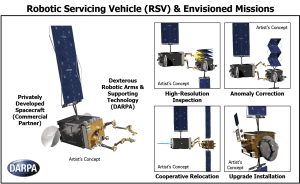Latest News
[Via Satellite 03-28-2016] The U.S. Defense Advanced Research Projects Agency (DARPA) is reviving its in-orbit servicing efforts through a new public-private partnership program called Robotic Servicing of Geosynchronous Satellites (RSGS). Under the RSGS vision, the partners would join a DARPA-developed modular toolkit, including hardware and software, to a privately developed spacecraft to create a commercially owned and operated Robotic Servicing Vehicle (RSV). DARPA would contribute the robotics technology, such as the previously developed Front End Robotic Enabling Near-Term Demonstration (FREND) robotic arm, expertise, and a government-provided launch. The commercial partner would contribute the satellite to carry the robotic payload, integration of the payload, and the mission operations center and staff.
DARPA seeks to develop and demonstrate the RSV on orbit within the next five years. The agency’s goals include demonstrating safe, reliable, useful and efficient operations in or near Geostationary Earth Orbit (GEO), demonstrating on live GEO satellites in collaboration with commercial and U.S. government spacecraft operators, and supporting the development of a servicer spacecraft with sufficient propellant and payload robustness to enable dozens of missions over several years.
DARPA plans to kick off the public-private partnership via a program solicitation in the near future. Shortly thereafter, DARPA will host a proposers day to provide potential partners with further details about the RSGS program. The agency plans to share the solicitation along with the date and location of the proposers day on the Federal Business Opportunities (FBO) website in the future.
“The ability to safely and cooperatively service satellites in GEO would vastly expand public and private opportunities in space. It could enable entirely new spacecraft designs and operations, including on-orbit assembly and maintenance, which could dramatically lower construction and deployment costs while extending satellite utility, resilience and reliability,” said RSGS Program Manager Gordon Roesler. “Commercial and government space operators have sought this capability for decades. By investing together, we can achieve a capability that would be extremely challenging to do individually.”
Current commercial in-orbit servicing programs are underway by Effective Space Solutions in Israel, and ViviSat in the U.S., with each aiming for commercial missions around 2018.
Get the latest Via Satellite news!
Subscribe Now